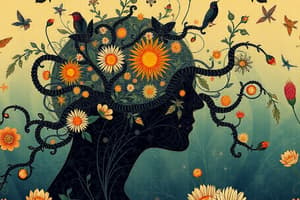Podcast
Questions and Answers
What does the Cannon-Bard theory of emotion propose about physiological arousal and emotional experience?
What does the Cannon-Bard theory of emotion propose about physiological arousal and emotional experience?
- They occur sequentially with arousal first.
- They happen simultaneously and independently. (correct)
- One causes the other.
- Arousal is always followed by labeling.
In the Schachter-Singer two-factor theory of emotion, what are the two components that make up emotion?
In the Schachter-Singer two-factor theory of emotion, what are the two components that make up emotion?
- Physiological arousal and physiological response.
- Cognitive labeling and behavioral response.
- Emotional experience and physical reaction.
- Physiological arousal and cognitive labeling. (correct)
According to the Schachter-Singer theory, when experiencing fear, what does cognitive labeling involve?
According to the Schachter-Singer theory, when experiencing fear, what does cognitive labeling involve?
- Interpreting bodily reactions in context to produce an emotional experience. (correct)
- Identifying external stimuli that cause emotion.
- Recognizing the emotion of fear without physical reaction.
- Knowing the physiological arousal is caused by external factors.
What does the facial-feedback hypothesis suggest about facial expressions?
What does the facial-feedback hypothesis suggest about facial expressions?
What does the Schachter-Singer theory suggest about the relationship between physiological arousal and emotional labeling?
What does the Schachter-Singer theory suggest about the relationship between physiological arousal and emotional labeling?
In the context of the Cannon-Bard theory, which of the following statements is true?
In the context of the Cannon-Bard theory, which of the following statements is true?
Which of the following best describes the Schachter-Singer two-factor theory's view on emotions?
Which of the following best describes the Schachter-Singer two-factor theory's view on emotions?
Which theory emphasizes that the emotional response can occur without physiological changes?
Which theory emphasizes that the emotional response can occur without physiological changes?
What does the Facial-Feedback Theory of Emotion suggest about facial expressions?
What does the Facial-Feedback Theory of Emotion suggest about facial expressions?
Which of the following limitations is associated with a forced smile?
Which of the following limitations is associated with a forced smile?
How does emotion relate to motivation?
How does emotion relate to motivation?
What is a method to improve motivation in tedious tasks?
What is a method to improve motivation in tedious tasks?
What is indicated by research on facial expressions during activities like reading?
What is indicated by research on facial expressions during activities like reading?
What is self-efficacy primarily concerned with?
What is self-efficacy primarily concerned with?
What characterizes individuals with high achievement motivation?
What characterizes individuals with high achievement motivation?
What is the primary challenge in delaying gratification, according to evolutionary psychology?
What is the primary challenge in delaying gratification, according to evolutionary psychology?
Which of the following best defines an emotion in psychological terms?
Which of the following best defines an emotion in psychological terms?
Which theory posits that emotions are a result of physiological arousal?
Which theory posits that emotions are a result of physiological arousal?
How do moods differ from emotions?
How do moods differ from emotions?
What components are involved in the psychological definition of emotion?
What components are involved in the psychological definition of emotion?
What does the Cannon-Bard Theory state about the experience of emotion?
What does the Cannon-Bard Theory state about the experience of emotion?
What is the primary function of motivation in behavior?
What is the primary function of motivation in behavior?
According to Drive-Reduction Theory, what occurs when a need is satisfied?
According to Drive-Reduction Theory, what occurs when a need is satisfied?
What does the Optimum Arousal Theory propose about motivation?
What does the Optimum Arousal Theory propose about motivation?
Which type of motivation is described as the desire for internal gratification?
Which type of motivation is described as the desire for internal gratification?
In Self-Determination Theory, which need is NOT one of the three basic psychological needs?
In Self-Determination Theory, which need is NOT one of the three basic psychological needs?
According to Maslow's Need Hierarchy, what happens when a specific need is not met?
According to Maslow's Need Hierarchy, what happens when a specific need is not met?
What is the primary focus of Incentive Theory?
What is the primary focus of Incentive Theory?
In the context of Drive-Reduction Theory, what is a 'drive'?
In the context of Drive-Reduction Theory, what is a 'drive'?
Flashcards are hidden until you start studying
Study Notes
Motivation
- Motivation influences initiation, direction, intensity, and persistence of behavior.
- It energizes, guides, and maintains behavior toward goals.
- Sources of motivation include biological (e.g., hunger) and psychological factors.
Needs and Drives
- A need represents a state of deficiency, requiring goal-directed behavior to fulfill.
- Drive refers to bodily tension from unmet needs, prompting action to satisfy them.
- Drive reduction theory focuses on restoring homeostasis by fulfilling biological needs.
Optimum Arousal Theory
- Individuals are motivated to maintain an optimal level of arousal, avoiding extremes.
- Performance is best under moderate arousal levels, as per the Yerkes-Dodson law.
Incentive Theory
- Motivation can be influenced by external incentives, differentiating between extrinsic (external rewards) and intrinsic (internal satisfaction).
- Self-Determination Theory emphasizes fulfilling needs for competence, relatedness, and autonomy.
Self-Efficacy and Achievement Motive
- Self-efficacy is the belief in one's capacity to succeed.
- Achievement motive drives individuals to set and pursue challenging goals relative to standards of excellence.
Delay Gratification
- Delay gratification involves resisting immediate rewards for more valued long-term rewards, essential for self-regulation.
- Evolutionary psychology explains challenges in delaying gratification due to uncertainty about future rewards.
Emotion
- Emotions are immediate responses to environmental events and can be classified as positive or negative.
- Three components of emotion: physiological processes, behavioral responses, and cognitive appraisals.
Theories of Emotion
- James-Lange Theory posits that emotions arise from physiological arousal, like feeling fear due to a racing heart.
- Cannon-Bard Theory asserts physiological arousal and emotional experience occur simultaneously and independently.
- Schachter-Singer Two-Factor Theory combines physiological arousal and cognitive labeling for interpreting emotions.
Building Happiness
- Facial-Feedback Hypothesis suggests facial expressions influence emotional experiences, with smiling potentially enhancing positive feelings.
- Real and genuine smiles differ from forced ones, affecting emotional states.
Relationship Between Motivation and Emotion
- Both constructs are linked through the Latin root meaning "to move," activating the need for action.
- Emotions can motivate behaviors; for example, happiness can enhance performance.
Improving Motivation
- High intrinsic motivation can be fostered; however, adding extrinsic motivation can also help in dull tasks.
Studying That Suits You
Use AI to generate personalized quizzes and flashcards to suit your learning preferences.




